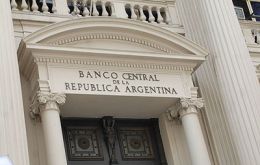MercoPress. South Atlantic News Agency
Stories for October 18th 2012
-
Thursday, October 18th 2012 - 10:41 UTC
Brazil-FAO sign agreement for cotton expertise transfer to small farmers in Africa

A 20 million dollars agreement signed Wednesday by the United Nations and Brazil will seek to transfer the expertise of the South American country to support cotton farmers in developing economies.
-
Thursday, October 18th 2012 - 10:33 UTC
Monsanto suspends collection of royalties in Brazil following state court ruling

Monsanto, the world’s biggest seed company, suspended collection of royalties for its Roundup Ready soybeans in Brazil while it appeals a state court ruling on intellectual property rights.
-
Thursday, October 18th 2012 - 07:29 UTC
Mercosur conflict still alive: Venezuela expels Paraguayan diplomats

Venezuela's government decided to expel Paraguay's remaining diplomats from the country, the top envoy at the Paraguayan Embassy said on Wednesday. Charge d'affaires Victor Casartelli said that he and three other Paraguayan diplomats in Caracas were told by Venezuela's Foreign Ministry to leave within three days.
-
Thursday, October 18th 2012 - 07:15 UTC
Argentina takes Falklands sovereignty claim complaint to the Security Council

The Argentine Foreign ministry said in an official release on Wednesday that the UN Security Council had received, and incorporated to its agenda, a formal complaint on the UK latest military exercises in the Falkland Islands.
-
Thursday, October 18th 2012 - 07:11 UTC
YPF sells medium term debt in Pesos equivalent to 423 million dollars

Argentina's state-controlled energy company YPF sold medium-term local currency debt equivalent to a total of 423.2 million dollars on Wednesday, a stock market filing showed.
-
Thursday, October 18th 2012 - 07:10 UTC
Ecuadorian court orders seizure of 200m dollars in Chevron oil assets

As part of an ongoing lawsuit between US Chevron oil and plaintiffs from various Amazonian villages, an Ecuadorian court has ordered the seizure of approximately 200 million dollars worth of the company's assets.
-
Thursday, October 18th 2012 - 07:02 UTC
Chilean far right push for extradition of Senator murder protected by Argentina

The Inter-American Commission of Human Rights (IACHR) began proceedings this week concerning Argentina’s refusal to extradite Galvarino Apablaza for the 1991 murder of emblematic conservative Senator Jaime Guzmán.
-
Thursday, October 18th 2012 - 06:57 UTC
Moody’s downgraded debt ratings of several Argentine provinces and cities

Moody's Investor Service announced on Wednesday it has downgraded the issuer and debt ratings of several provinces and cities in Argentina, due to the risks these states may face to access foreign currency and “serve their obligations in foreign currency.”
-
Thursday, October 18th 2012 - 06:52 UTC
Lula da Silva calls for Argentine/Brazilian business corporations

Brazil's former President Lula Da Silva blasted the “protectionist” measures of the developed countries and called for the alliance between businessmen from his country and Argentina's, as he highlighted that Brazil “grows, but with a controlled inflation rate”.
-
Thursday, October 18th 2012 - 06:49 UTC
Argentina's sovereign debt, a matter of time says The Economist

When Argentina proposed a brutal 65% haircut to holders of its defaulted sovereign bonds in a 2005 restructuring, one argument the country’s officials used to justify the offer was that the country could not take on more debt than it could reasonably expect to pay. As painful as the loss might be, the argument went at least the new bonds the government would issue would be creditworthy.
